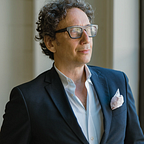From Great to Good(ness)
Determining the GOAT requires a different kind of math
The name of the venue is Roland Garros, but those who follow professional tennis know it as the House of Rafa Nadal.
Every player who steps onto la terre battue is Rafa’s guest, whether one is playing him in the French Open or not.
After winning the tournament 13 times since 2005, something no other mortal has done at any major, it can be said that there’s enough of the Spaniard in that orange soil to consider it — the clay — a blood relative.
In his Paris home and natural habitat, Rafa remains the perfect host: humble, thoughtful, attentive, gracious.
Nobody knows this better than Alexander “Sascha” Zverev.
Zverev, ranked #3 in the world, went down hard Friday afternoon in a grueling second set of the first men’s semifinal at Roland Garros just past the three-hour mark.
Dashing for a ball, the German’s ankle buckled and, for a millisecond, the side of his right foot looked as if it were parallel to the court.
One of the first people who appeared at Zverev’s side was his ferocious opponent, Rafa Nadal. Faster than the human eye could detect, Rafa transformed himself: From the Spanish Minotaur, a merciless emperor in a labyrinth of clay, into an angel of mercy.
Moments before, Rafa’s jaw was grimly set and his eyes were ablaze with supernatural determination. Standing over his fallen opponent in a Nike kit soaked through with sweat, his face softened, drained of all ferocity. His eyes were bathed in compassion.
For viewers, watching Zverev’s foot turn inward at 90 degrees in real time was excruciating. But to see 36-year-old Rafa Nadal take on the German’s pain — forgetting his own mental and physical exhaustion in pursuit of another French Open title, forgetting his own chronic agony caused by a spiteful navicular bone, worsening with every match — well, that…that was sublime.
Writhing in pain, Zverev was whisked away in a wheelchair. A few minutes later, Rafa ducked off court almost as if he were making sure his “guest” was receiving the best possible treatment in his house.
We didn’t need such a scene to understand just how serious the ankle injury is — Jim Courier, who was calling the match for Tennis Channel with Jason Goodall, dropped an expletive freighted with woe immediately following a commercial break, not knowing he and Goodall were live. (A day later, ESPN would report that Zverev had in fact torn “several lateral ligaments.”)
When Zverev returned to the court on crutches to shake the umpire’s hand and officially retire from the match, Rafa stepped up again and gave the 25-year-old German a warm, brotherly embrace.
One would expect nothing less from a kind and consummate host in the latest iteration of a house that he built.
The sleepless Greek chorus of social media is calling Rafa’s actions “classy.” But they have nothing to do with class or classiness; it’s just what being a thinking, feeling human being looks like.
Rafa said as much later:
“To see him crying is a very tough moment…if you are human you should feel very sorry for a colleague.”
Odds are that Rafa will, literally, sink his teeth into one of the silver handles of La Coupe des Mousquetaires and claim his 14th French Open title at Roland Garros on Sunday, thus securing his 22nd victory at a major — the most in history. Win or lose, there will be a lot of banter about who is the GOAT for years to come, given the feral obstinacy of the fans of his rivals, Roger Federer and Novak Djokovic, not to mention the deep devotion of The Rafalists.
But on a Friday afternoon in Paris, France, under the roof of Court Philippe Chatrier, Rafa Nadal upended the GOAT conversation.
He demonstrated, conclusively, that while the best in world sport is easily calculated by wins and losses, the Greatest Of All Time is tabulated very differently.
For that answer, we must measure the greatness of heart, something T. Franklin Murphy describes as “being kind to the world, extending beyond our own boundaries, with empathetic understanding to others.
“With greatness of heart, we change; and subsequently we change the world.”
This is a goodness greater than great— greater than The Greatest — and it is something we can neither ascertain nor believe as human beings until we feel it.
If you witnessed Rafa tend to a wounded competitor; if you saw his ready embrace; if you heard him speak of another’s pain with a tightness in his throat, you would have felt, suddenly, a strange tightness in your own throat.
And if your heart felt like a vase which could be filled only with loving kindness, you would believe a little now, too.
